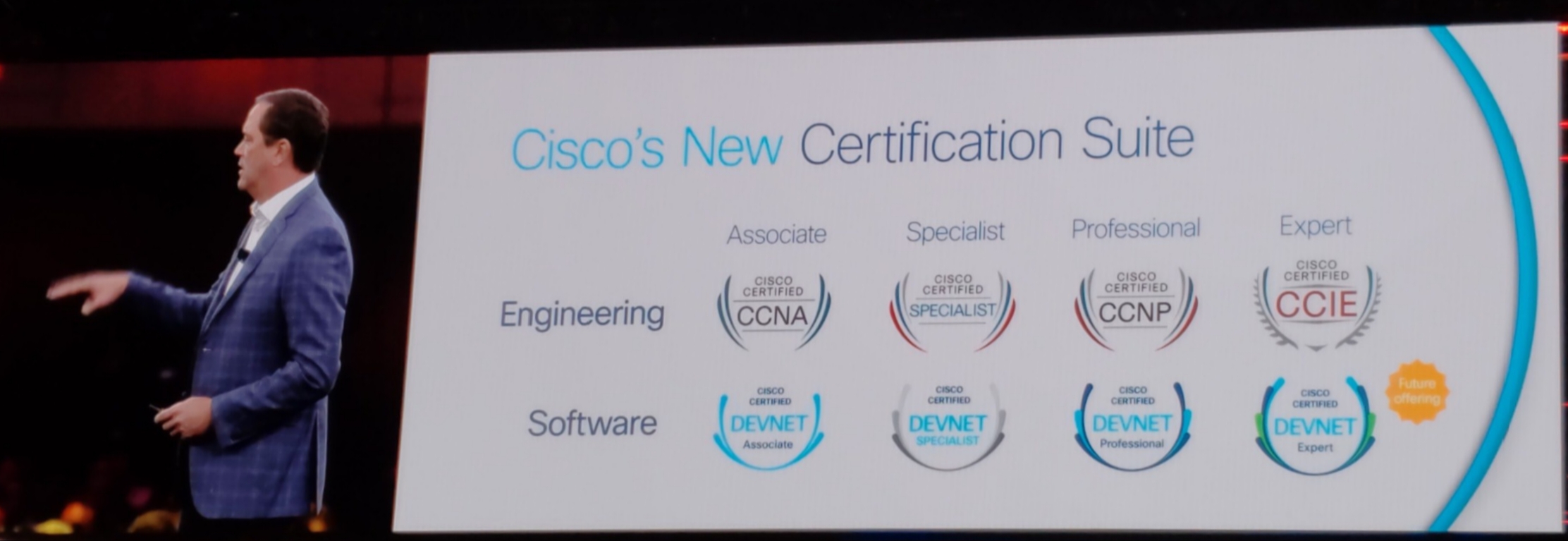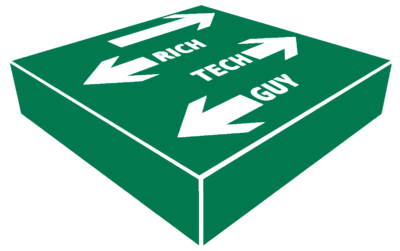5 Key Takeaways About the New Cisco Certification Program
July 1, 2019
 Cisco CEO Chuck Robbins presenting on the new Cisco Certification program at Cisco Live 2019.
Cisco CEO Chuck Robbins presenting on the new Cisco Certification program at Cisco Live 2019.
Last month, Cisco announced a huge change to the certification program which will go live on February 24th, 2020. I have written posts on the CCNA, CCNP & Specialist Certifications, the new CCIE program and the DevNet Certifications. In summarizing all of these changes, here are 5 key takeaways regarding the new Cisco certification program.
1. Keep working towards your current certs!
If you are currently working towards a Cisco Certification, keep working. This cannot be stressed enough, but here are some scenarios that illustrate why you need to keep going.
CCNA: While the new CCNA will be a broad, generalist certification and all of the current CCNAs will disappear in the new program, there is still a benefit to earning your CCNA before the changeover. First, your CCNA will carry over to the new program so you will have that locked away. Second, you will receive a Technology Badge based on your current CCNA Cert when the new program starts which will show that you have knowledge in that technology track.
CCNP: The new CCNP certification will be able to be earned on just two exams, a technology core exam and a specialist exam in that technology track. But if you earn the CCNP before the changeover, not only will you have the new CCNP, but you will also have a Specialist certification based on each exam that you passed to earn the current CCNP. If you don’t complete the CCNP before the new program goes live, you will still earn Specialist Certifications based on the exams you did pass and when the new program starts, you will only need to take the technology core exam to earn your CCNP.
2. The new CCNA shows general knowledge of networking & security principles
Back in the day when I was getting a CCNA, there was only one CCNA to choose from and it showed that you had established foundational knowledge of the OSI model, Layer 3 routing protocols, layer 2 switching topology and WAN access. It was the only CCNA option and it began my career in the tech industry. That CCNA later was changed to become the CCNA Routing and Switching as Cisco added a plethora of other CCNA programs at which point, I earned a CCNA Security. Now Cisco is going back to the old model where the CCNA will show that you have the foundation for starting your career in the IT world.
Looking at the new CCNA exam topics, you will see that it is looking for that foundational knowledge as it did before the additional CCNA programs were introduced, but with a couple of additions that match the requirements of the IT industry today, those additions are testing on security concepts and on automation and programmability. This will still be a recommended certification for anyone looking to start a career in Technology/IT.
3. Specialist Certifications will prove your worth with employers
With the CCNA taking on a more generalist role, the real value in employer’s eyes will be the specialist certifications. The specialist exams will focus on a specific technology within one of the encompassing technology tracks and holding these specialist certifications will show to your employer or to potential employers that you possess the knowledge and skillsets of the technology track.
While you will be able to get a CCNP by just passing the core and specialist exams, having a CCNP with multiple specialist certs in that technology focus will set you ahead. Using the CCNP Security as an example, someone with a CCNP Security & Specialist certifications in, Network Security Firepower, Email Content Security, Web Content Security, and Security Identity Management Implementation will show much stronger technically than a CCNP Security with just a Web Content Security Specialist certification. Employers will also adjust job postings looking for specific specialist certifications.
4. Get into DevNet!
If you haven’t gotten into DevNet yet, do yourself a favor and go to developer.cisco.com now and get started in DevNet. Once there, start learning about programming and automation for the technologies that you work with. Automating tasks and systems is already in high demand and the demand will only increase as we move forward.
The new DevNet certifications also provide you with the ability to get a CCNP, a DevNet Professional Certification, and a DevNet Specialist certification with just three exams. Here’s how it would work (using Data Center as an example). First, you take the DCAUTO exam and get the DevNet Specialist certification for Data Center. Then you combine that by taking the DCCOR exam and you will have a CCNP Data Center. Third, you take the DEVCOR exam and it will be combined with the DCAUTO exam giving you a DevNet Professional Certification.
Take a look at my post on the DevNet certifications for more information.
5. Use a Layered approach to building your certifications.
Once you have a CCNA, you will be able to earn future certifications by just passing one test and getting the new certification, if you structure it right. Let’s use the Enterprise track as an example.
- Earned CCNA (Note: not a prerequisite for higher level certs in the new program)
- Take the ENASRI exam, pass and earn the Specialist Certification for Enterprise Advanced Routing and Services
- Take the ENCOR exam, pass and earn the CCNP Enterprise, also qualify to take the CCIE Enterprise lab exam.
- Pass the CCIE Enterprise lab exam and you have a CCNP.
This is a simplified take on the exam process and in reality, you would want to pass multiple Enterprise Specialist exams before attempting the CCIE lab exam. However, this does show how you can work your way up the certification ladder one exam at a time.
Bonus for CCIEs: Pay close attention to the new recertify date policy.
As I brought up in the post on the new CCIE program, there will be a change to the recertification policy of CCIE’s. The current policy is that your CCIE is valid for two years based on anniversary date with an extra year in suspended status should you fail to renew within the two-year timeframe. The new policy will be that your CCIE is valid for three years from the date in which it was last renewed, and there is no suspended year. If you have a CCIE, log into the CCIE portal or the certification tracking page on February 24th, 2020 and verify your new expiration date.
Keep studying, Keep learning, Keep improving yourself.

